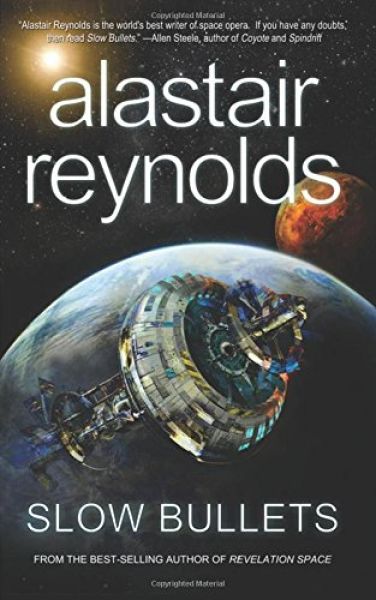The Sleepers Wake
Slow Bullets
By Alastair Reynolds

10 Jun, 2015
Military Speculative Fiction That Doesn't Suck
0 comments
Alastair Reynolds may be best known for his series, such as the Revelation Space novels or the Poseidon’s Children books. However, he can also work in less expansive formats. 2015’s Slow Bullets is a standalone novella, one that fits nicely into my MilSF review series.
The bitter war between the Central Worlds and the Peripheral System has wound down towards a bitter peace, but not in time to keep conscript soldier Scur from falling into the hands of enemy soldier Orvin and his minions. Wartime for Orvin is license for atrocity; Scur’s time with Orvin is unpleasant and she only barely survives Orvin’s attempts to murder her.
Consigned to post-combat hibernation, Scur wakes to discover adapting to the post-war environment is far more difficult than she could have expected.
The first sign that something has gone horribly wrong comes as soon as Scur wakes; she is on an unfamiliar starship that had been destined for who knows where. The ship has clearly suffered some sort of mishap and the crew, judging by the crew member she saves from a rampaging mob of woken sleepers, has lost control of the situation.
Scur appears to have been loaded on a ship whose frozen cargo was supposed to be made up of war criminals. She was an afterthought; some unnamed functionary wanted a full ship and she was available (and being frozen, unable to protest). Most of the transportees are hardened criminals collected from both sides of the war. One of them is none other than her old acquaintance Orvin.
That would be bad enough but not only is the transport ship in rough shape, it’s orbiting an unfamiliar world in a region of space not immediately identifiable. Yet it does not seem that the ship’s navigation systems have broken down. External signposts like pulsars can be used to establish where they are, but it soon becomes obvious that’s not the most pressing question they could be asking.
What they should be asking is “when are they?” followed closely by “where exactly did human civilization go?”
~oOo~
British science fiction is notable for its propensity to gloom. Perhaps this is due to exposure to the soul-killing excesses of Post-War Brutalist architecture in the UK. It could be folk memory of the collapse of civilization in the fifth century and the barbarian invasions that followed. Or it could be the despairing knowledge that every attempt by humans to colonize Britain save one has ended in extinction due to climate change [1]. This book is a fine example of British despondency, beginning with the monumental injustice that ships Scur with criminals and culminating in the myriad ways that the situation is so much worse than the castaways could possibly have imagined.
The basic situation facing the prisoners is one familiar to anyone who has read stories like Niven’s “One Face” or Anderson’s “Epilog.” Familiar, but not exactly the same. The castaways are not nearly as marooned as the unfortunates in either of those stories, but on the other hand … an inexplicable something has worked some impressive physical transformations on their once-familiar worlds. The situation is also something like that faced by the protagonists of Joe Haldeman’s The Forever War; veterans trying to build new lives in a universe changed beyond recognition.
While many of the characters in this book are less than empathetic (Scur, for example, is the sort of person who believes that the best way to organize disorderly mobs is threatening to kill them all), they do manage to cooperate sufficiently to halt the social collapse, save what can be saved from the forces of entropy, and kickstart recovery. The characters may not be particularly loveable but at least they seem to be more efficient than the characters in “We Who Are About To…”.
I often complain that modern books are too long, but in this case, I am forced to say that while the novella is a fine and respectable form, in this case it seemed a bit too short for the amount of story on offer. The background cannot be developed in much detail and important events take place off-screen. I would be very interested in seeing this expanded out to novel length.
Slow Bullets is available from Tachyon Press.
1: It may be significant, given that the agency of doom for the lost British cultures has always been ice sheets migrating southward, that the Outside Context Problem facing civilization in this book includes artificially induced climate change of the cooling variety.
